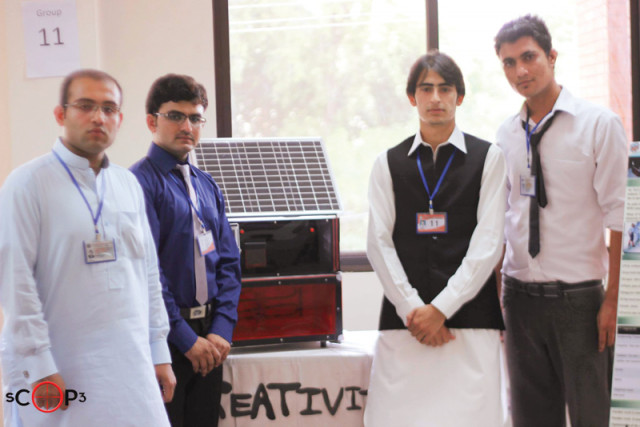Maintaining the cold chain: UET students build solar-powered portable cooler for vaccines
Consuming only 35 watts, the device can carry up to 300 vials at WHO-recommended temperature.

Students of the University of Engineering and Technology (UET) have designed a transportable solar-powered cooler which can keep medicinal vaccines at temperatures recommended by the World Health Organization (WHO).
A team of final year students of the mechanical engineering department at UET, Irfanullah, Farrukh Saleem, Muhammad Adnan and Shahrukh Khan, are the architects behind the design. The portable refrigerator can keep vaccines between the standard recommended temperatures of 2 to 8 degrees centigrade. Vaccines tend to spoil if the temperature falls below 2 degrees centigrade or goes above 8 degrees centigrade.
“More than 1.6 billion people in today’s world, from both developed and underdeveloped countries, don’t have access to electricity,” said Irfanullah while talking to The Express Tribune. These people are also the same cohort that is more susceptible to diseases like polio, mumps and measles, he added.

Power shortages further deprive people from getting proper protection against diseases as outages mean vaccines cannot be stored in optimal condition and often spoil, said Irfanullah. “In order to address this issue, our group came up with this unique concept to keep vaccines cool using a different power inputs.”
Versatile design
One of the design objectives was to make the cooler operable by multiple power sources.
The UET vaccine cooler can work powered by a 220-volt source as well as a 12-volt battery, chargeable by solar power or the terminals of a car battery.
“So it can even work in areas where there is no electricity. It was designed keeping in mind remote places,” added Irfanullah.
According to Saleem, the team first collected all relevant theoretical data about the project – refrigerants, tubing, the main assembly as well as other integral parts of the design. “On the basis of our theoretical framework, we fabricated all parts of the refrigerator.”
Will it work?
Then began the experiments, said Saleem. Each experiment was planned to test the cooler’s performance according to its design specifications.
The results confirmed the cooler is indeed operable by an external 220-volt source. The inbuilt battery takes an hour to charge fully from a 220-volt source.
Once disconnected, the cooler automatically switches to its internal battery and its operation continues uninterrupted.
According to the tests, when the portable refrigerator is out in the sun without a power source, it uses the solar panels installed on the cooler to continue working. Under those conditions, the refrigerator will continue functioning for at least six to seven hours. It works at minimum power consumption, at 35 watts – the lowest currently available, said Saleem.
Around 300 vials can be stored in this portable refrigerator at optimum temperature, added Saleem.
The capacity can be increased by increasing the power input. The total cost of the project is estimated at Rs30,000.
Published in The Express Tribune, July 1st, 2014.



















COMMENTS
Comments are moderated and generally will be posted if they are on-topic and not abusive.
For more information, please see our Comments FAQ